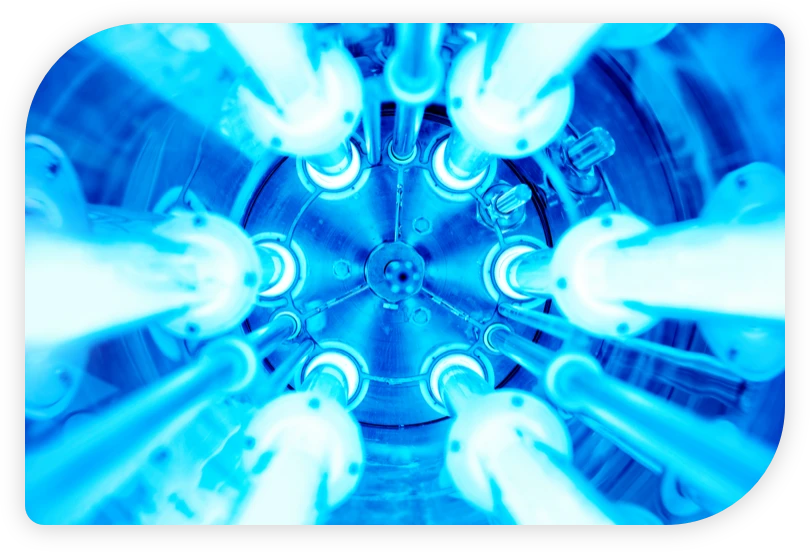
UV Light Water Treatment
In our exploration of UV light water treatment, we unveil the secrets of this ancient yet highly effective disinfection method. As a premier provider of water services in Vancouver Island and the Vancouver area, Integra Water is dedicated to enhancing the quality of drinking water for residential households. Join us on this journey as we unravel the mysteries of UV water filtration systems, understanding their mechanisms, benefits, and how they seamlessly integrate into modern water treatment solutions. Discover the transformative power of UV light in safeguarding your water against a myriad of contaminants, setting a new standard for clean, crisp, and environmentally friendly hydration.
How Does UV Light Water Treatment Enhance Your Drinking Water Quality?
Beyond the bounds of modern technology lies an ancient yet potent solution: ultraviolet (UV) light from the sun. Comparable to its effects on skin cells, UV light disrupts the DNA of microorganisms, preventing replication and disease. In this discussion, we delve into the integration of this natural technology into contemporary water filtration systems, specifically exploring its impact on home water quality, including well water.
How Does a UV Water Filter Operate?
Encased in stainless steel, water flows through a UV bulb protected by a clear quartz sleeve. Emitting UV-C light, this germicidal wavelength penetrates the water, while sensors ensure adequate UV output. A control unit manages flow rates, adjusting if needed. Notably, UV water treatment doesn’t physically remove particles but disinfects, offering a different outcome compared to traditional filters.
What Pathogens Does UV Light Water Treatment Target?
UV light neutralizes a spectrum of waterborne threats, including viruses, bacteria, cysts, coliform, Salmonella, Giardia, E. coli, Cryptosporidium, and more. Particularly effective against chlorine-resistant parasites like Cryptosporidium and Giardia, UV sterilizers eliminate microbiological risks present in public water supplies, providing a vital layer of protection.
What Sets UV Light Treatment Apart from Chemical Treatment?
Unlike chlorine, a common water treatment chemical, UV light doesn’t create harmful byproducts. However, UV can be hindered by water turbidity. Combining chemical and UV methods can optimize pathogen elimination while minimizing chlorine usage. This synergy is crucial for private well owners facing similar challenges.
Is UV Light Water Treatment Safe?
Regulated by the U.S. EPA, UV treatment systems confine rays within a steel casing, directing them solely toward water. As a chemical-free, environmentally friendly solution, UV treatment provides an additional safety layer without altering water taste or drying skin, as chlorine might.
How Does UV Light Affect Well Water Purity?
Prominent water treatment plants worldwide, like NYC’s, leverage UV light for its effectiveness. For private wells, self-implemented filtration is imperative. Combining UV treatment with pre-filtration technologies improves water purity, addressing diverse contaminants.
Does UV Light Remove Chlorine?
UV treatment doesn’t remove chlorine but reduces the need for its addition during the treatment process. For chlorine removal, other filtration methods, such as activated charcoal filters, reverse osmosis, or KDF media filters, are recommended.
UV Light vs. Boiling Water: Which is Better?
Both UV light and boiling effectively eliminate microorganisms. UV excels when water is clear, offering a more practical, efficient solution for daily water needs. Boiling, while effective, requires more effort, smaller batches, and cooling time, making it less suitable for routine use.
What’s the Ideal UV Light Water Treatment Setup?
Ideally, pre-filter water before UV exposure to prevent sediment interference. Combining a UV system with a water softener enhances effectiveness, especially in hard water regions.
Are There Drawbacks to UV Water Treatment?
UV systems add cost and electricity usage. Annual light bulb replacement is necessary but straightforward. While not a standalone solution, a UV water sterilizer enhances existing filtration, providing an additional layer of protection.
How Much UV Light is Needed for Well Water?
UV systems, ensure a germicidal dose of 30 mJ/cm2, effective against common waterborne microorganisms. UV intensity, exposure time, and flow rate impact dosage, with systems featuring sensors for continuous monitoring.
Ultraviolet Disinfection for Crisp, Clean Water
Harnessing the timeless power of the sun, UV light water treatment by Integra Water elevates water quality for residential households. Offering a chemical-free, environmentally friendly solution, the UV disinfection system seamlessly integrates with existing filtration, ensuring a constant supply of pure, great-tasting water for every sip.